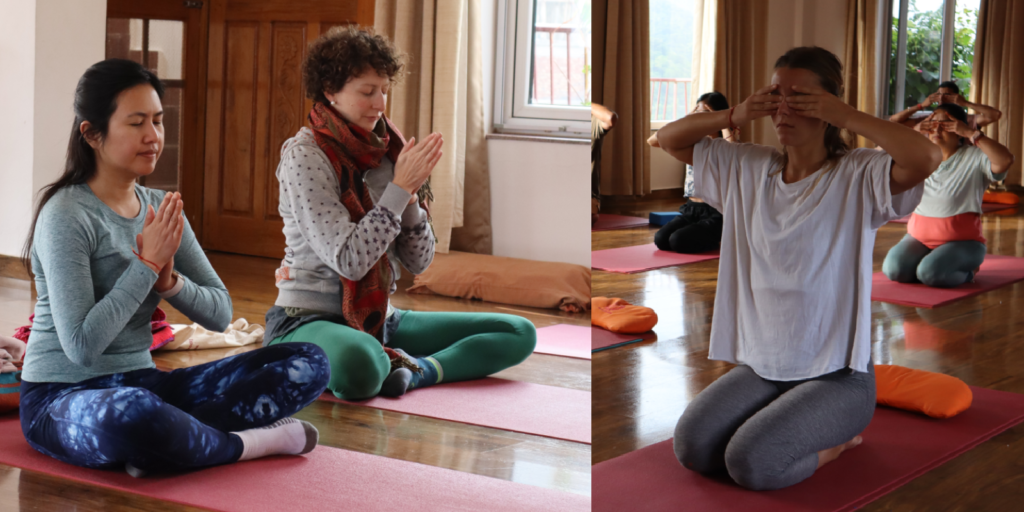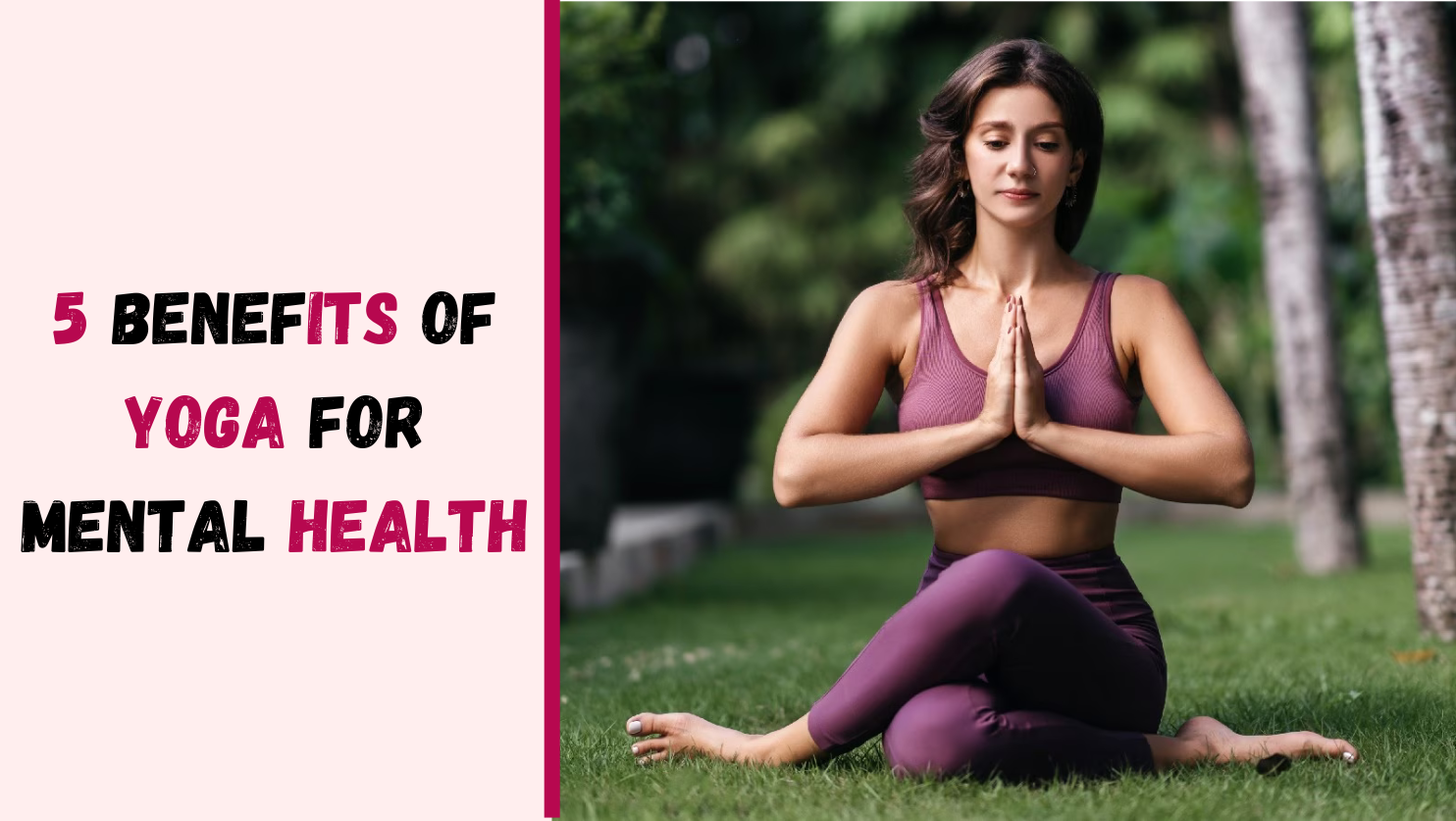Yoga, an ancient practice that combines physical postures, breathing exercises, and meditation, has been celebrated for its numerous health benefits. While many people associate yoga primarily with physical flexibility and strength, it also offers profound benefits for mental health. Here are five comprehensive ways in which yog supports mental well-being:
1. Stress Reduction Yoga
a. Activation of the Parasympathetic Nervous System:
Yoga effectively engages the parasympathetic nervous system (PNS), often referred to as the “rest-and-digest” system, which counterbalances the sympathetic nervous system (SNS) responsible for the fight-or-flight response. This balance is critical for maintaining mental and physical well-being.
Through practices such as deep diaphragmatic breathing, gentle stretching, and mindful movement, yog reduces activation of the SNS. These activities lower cortisol levels, the body’s primary stress hormone, fostering a state of relaxation and calm. This shift not only helps alleviate acute stress but also contributes to long-term stress resilience, improving overall mental health.
b. Mindfulness and Present Moment Awareness:
Yoga inherently cultivates mindfulness, the practice of being fully present and engaged in the moment. By directing attention to the breath, bodily sensations, and the flow of movement during yog practice, individuals learn to anchor their awareness in the here and now.
This focused attention reduces rumination—repetitive thoughts about past experiences—and mitigates anxiety about the future, two common contributors to stress. The mindfulness developed through yog not only diminishes stress during practice but also carries over into daily life, enhancing one’s ability to respond to challenges with greater clarity and calm.

2. Enhanced Emotional Regulation
a. Improved Mood:
Yoga inherently cultivates mindfulness, the practice of being fully present and engaged in the moment. By directing attention to the breath, bodily sensations, and the flow of movement during yoga practice, individuals learn to anchor their awareness in the here and now.
This focused attention reduces rumination—repetitive thoughts about past experiences—and mitigates anxiety about the future, two common contributors to stress. The mindfulness developed through yoga not only diminishes stress during practice but also carries over into daily life, enhancing one’s ability to respond to challenges with greater clarity and calm.
b. Greater Emotional Awareness:
Yoga deepens the connection between the mind and body, fostering an enhanced ability to recognize and understand one’s emotions. By focusing on breathwork, movement, and mindfulness, yoga encourages practitioners to observe their emotional states without judgment.
This heightened self-awareness creates space to identify emotional triggers and understand their origins, promoting healthier responses. Over time, this practice strengthens emotional regulation, enabling individuals to navigate challenging situations with greater calm and composure.
3. Better Sleep Quality
a. Promotion of Relaxation:
Yoga deepens the connection between the mind and body, fostering an enhanced ability to recognize and understand one’s emotions. By focusing on breathwork, movement, and mindfulness, yoga encourages practitioners to observe their emotional states without judgment.
This heightened self-awareness creates space to identify emotional triggers and understand their origins, promoting healthier responses. Over time, this practice strengthens emotional regulation, enabling individuals to navigate challenging situations with greater calm and composure.
b. Reduction of Insomnia Symptoms:
Research indicates that yoga is highly effective in alleviating symptoms of insomnia. The combination of gentle physical activity and mental focus in yoga helps release physical tension and quiet the mind, two key contributors to sleeplessness.
Yoga practices such as slow, mindful breathing and meditative techniques foster a sense of tranquility, preparing the body and mind for restful sleep. By addressing both the physiological and psychological aspects of sleep disturbances, yoga promotes healthier, more consistent sleep patterns over time.

4. Increased Resilience and Coping Skills
a. Development of a Positive Outlook:
Yoga emphasizes acceptance and non-judgment, guiding practitioners to observe their thoughts, emotions, and physical sensations with compassion rather than criticism. This philosophy encourages a shift from self-criticism to self-acceptance, fostering a more positive and empowering mindset.
By integrating these principles into daily life, yoga helps build resilience, enabling individuals to approach life’s challenges with greater adaptability and calm. Over time, this practice promotes a deeper sense of inner peace and the ability to view difficulties as opportunities for growth. In a Yoga TTC in Rishikesh, students learn to cultivate this resilience and inner peace through focused practice, preparing them to teach others how to embrace challenges with balance and mindfulness.
b. Building a Supportive Community:
Yoga classes frequently create a warm, inclusive environment that fosters a sense of community and connection among practitioners. Sharing the yoga journey with others provides valuable social support, an essential element for building resilience and effectively coping with stress.
Group classes, workshops, and retreats offer opportunities to connect with like-minded individuals, exchange experiences, and form lasting relationships. This sense of belonging not only enhances emotional well-being but also reinforces commitment to regular practice, amplifying yoga’s benefits for both mental and physical health.
5. Enhanced Cognitive Function
a. Improved Concentration and Memory:
Yoga classes frequently create a warm, inclusive environment that fosters a sense of community and connection among practitioners. Sharing the yog journey with others provides valuable social support, an essential element for building resilience and effectively coping with stress.
Group classes, workshops, and retreats offer opportunities to connect with like-minded individuals, exchange experiences, and form lasting relationships. This sense of belonging not only enhances emotional well-being but also reinforces commitment to regular practice, amplifying yoga’s benefits for both mental and physical health.
b. Reduction of Cognitive Decline:
Yog and meditation have been shown to play a protective role in maintaining brain health and slowing the rate of cognitive decline in older adults. Regular practice supports neuroplasticity, the brain’s ability to adapt and form new neural connections, which is vital for preserving cognitive function as we age.
Research suggests that yoga and meditation can help reduce the risk of neurodegenerative diseases like Alzheimer’s and Parkinson’s by improving memory, attention, and executive function. Additionally, the stress-reducing benefits of yog lower inflammation and oxidative stress, both of which are associated with accelerated cognitive decline.
Conclusion
Incorporating yog into your routine can have far-reaching effects on mental health, from reducing stress and improving emotional regulation to enhancing cognitive function and sleep quality. Its holistic approach addresses the mind, body, and spirit, offering a comprehensive way to achieve mental well-being. As with any practice, consistency is key, and the benefits of yoga often become more pronounced with regular and dedicated practice.
Whether you are seeking to alleviate symptoms of mental health conditions or simply aiming to enhance your overall well-being, yog presents a powerful and accessible tool for achieving a healthier mind. Those enrolled in a 300 Hour Yoga Teacher Training in Rishikesh delve deeper into these mental health benefits, learning to integrate them into their teaching and personal practice.




